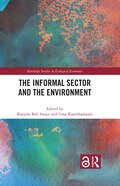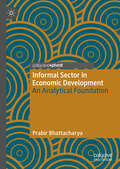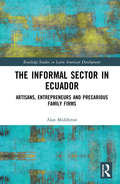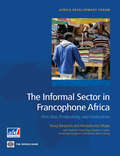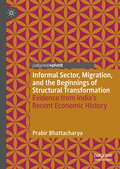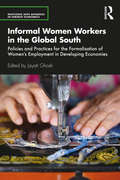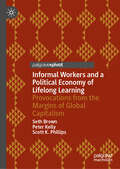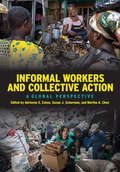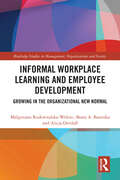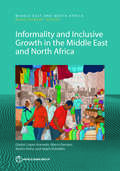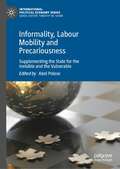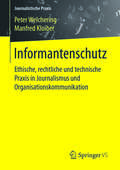- Table View
- List View
Informal Networks: The Company Behind the Chart
by Jeffrey R. Hanson David KrackhardtA formal organizational chart won't reveal which people confer on technical matters or discuss office politics over lunch. Much of the real work in any company gets done through an informal organization, with complex networks of relationships that cross functions and divisions. According to the authors, managers can harness the power in their companies by diagramming the advice network, which reveals the people to whom others turn to get work done; the trust network, which uncovers who shares delicate information; and the communication network, which shows who talks about work-related matters.
The Informal Sector and the Environment (Routledge Studies in Ecological Economics)
by Ranjula Bali SwainThe informal economy – broadly defined as economic activity that is not subject to government regulation or taxation – sustains a large part of the world's workforce. It is a diverse, complex and growing area of activity. However, being largely unregulated, its impact on the environment has not been closely scrutinised or analysed. This edited volume demonstrates that the informal sector is a major source of environmental pollution and a major reason behind the environmental degradation accompanying the expansion of economic activity in developing countries. Environmental regulation and economic incentive policies are difficult to implement in this sector because economic units are unregistered, geographically dispersed and difficult to identify. Moreover, given their limited capital base, they cannot afford to pay pollution fees or install pollution abating equipment. Informal manufacturing units often operate under unscientific and unhealthy conditions, further contributing to polluting the environment. The book emphasizes and examines these challenges, and their solutions, encountered in various sectors of the informal economy, including urban waste pickers, small-scale farmers, informal workers, home-based workers, street vendors, and more. If the informal sector is to "Leave no one behind" (as the Sustainable Development Goals promise) and contribute to "inclusive growth" (an objective of the green economy), then its impact on the economy as well as the environment has to be carefully considered. This book marks a significant contribution to the literature on both the informal economy and sustainable development, and will be of great interest to readers in economics, geography, politics, environment studies and public policy more broadly.
Informal Sector in Economic Development: An Analytical Foundation
by Prabir BhattacharyaThis book bridges the gap between theoretical and empirical understandings of the informal sector to provide insight into the role of the informal sector within the development process. By analysing three economic sectors, it sets out a framework for analysing urbanisation, rural-urban migration, agriculture- industry relationship, income inequality, structural change, employment, and optimal growth. Through highlighting the economic contribution of the informal sector, its impact on the national output and influence on the labour market is shown, alongside how employment opportunities in the informal sector drive rural and urban migration. This book presents a nuanced understanding of the dynamics of the informal sector and its role in the development of economies. It will be of interest to researchers and policymakers working within development economics and growth economics.
The Informal Sector in Ecuador: Artisans, Entrepreneurs and Precarious Family Firms (Routledge Studies in Latin American Development)
by Alan MiddletonThis book looks back over the last forty years of change and development in Ecuador, showing how macro level changes have impacted families and workplaces on the local level. Traditionally a dependent economy reliant on agricultural exports, the impact of neoliberalism and new sources of income from oil have transformed the informal and artisanal sectors in Ecuador. Exploring these dynamics using a combination of micro and macro analyses, this book demonstrates how the social relations of the sector are connected to the wider social, economic and political systems in which they operate. The book dives into the links between micro-production and the wider economy, including the relationships between different types of artisanal enterprises and their customers, their connections to the private sector and the state, the importance of social networks and social capital and the relevance of finance capital in microenterprise development. Overall, the analysis investigates how artisans, entrepreneurs and family-based enterprises seek to protect their interests when faced with neoliberal policies and the impacts of globalisation. This remarkable longitudinal study will be of considerable interest to researchers of development studies, economics, sociology, anthropology, geography and Latin American Studies.
The Informal Sector in Francophone Africa
by Ahmadou Aly Mbaye Birahim Bouna Niang Stephen S. Golub Dominique Haughton Ibrahima Thione Diop Nancy BenjaminThe informal sector in West Africa has some distinctive characteristics. Informality usually connotes small and unorganized producers operating on the fringes of the formal economy. In West African countries, however, the normal situation is to some extent reversed: a dynamic informal sector dominates the stagnant formal economy. Moreover, in these countries, small operators coexist with very large and politically well-connected informal enterprises and well-organized networks. Notwithstanding its importance, there have been relatively few systematic studies of this dual feature of the informal sector in West Africa, and consequently too little is known about it. One of our hypotheses is that determinants and appropriate policy responses are likely to differ between "large" and "small" informal operations. This volume focuses on the urban informal sector in three capital cities: Dakar (Senegal), Cotonou (Benin) and Ouagadougou (Burkina Faso). These three countries have important differences and as a group, are quite representative of francophone West Africa and to a lesser extent West Africa as a whole. The authors use a mix of quantitative and qualitative approaches with data obtained from our new Bank surveys of 900 firms in the three cities, interviews with knowledgeable stakeholders and participants, and all available secondary data. For the surveys, the authors designed their sampling strategy to include three distinctive categories of firms: formal, small informal, and large informal. In addition, they developed a comprehensive definition of informality to reflect its complexity and heterogeneneity. The definition (Chapter 1) covers six components of informality, whereas previous definitions are generally limited to a binary classification based on one or two indicators. The results for West Africa corroborate many findings from earlier studies, particularly for small informal firms. In addition, the authors break new ground by shedding light on the large informal sector and the influence of institutional and socio-cultural factors in shaping the informal sector.
Informal Sector Innovations: Insights from the Global South
by Mammo Muchie, Saradindu Bhaduri, Angathevar Baskaran and Fayaz Ahmad SheikhIt is well documented that the space of informal economic activity is rising across the globe. This rise has been particularly significant in the least developed and developing countries, especially after the onset of neo-liberal policies and withdrawal of welfare state. There has also been a shift in academic thinking on informal sector, with attempts being made to understand the contribution of informal sector in generating employment and economic growth rather than focusing solely on exploitative labour conditions in these economic activities. Indeed, with the retreat of welfare state and the introduction of contract labour in the formal sector, many issues related to occupational hazards and improper labour conditions do not remain unique to the informal sectors of the economy, particularly in less developed countries.This volume addresses a specific concern: the issue of knowledge generation and innovative activities, which lies at the core of sustained competitive advantage of these activities. The chapters in this book were originally published in the African Journal of Science Technology Innovation and Development.
Informal Sector, Migration, and the Beginnings of Structural Transformation: Evidence from India’s Recent Economic History
by Prabir BhattacharyaThis book explores the role of the informal sector at the beginning of the structural transformation of the Indian economy. It highlights the dynamic nature of the informal sector and the crucial role that it played in that transformation. The growth of the informal sector is analysed alongside the decline in agriculture and the growth of industry. Issues such as unemployment, wages, rural-to-rural migration, in addition to rural-to-urban migration, are discussed. The book also considers the role of social factors, including those relating to caste and tribe, in migration decisions. It also highlights the links between migration, the informal sector, and economic growth that are also relevant to other developing countries. This book will be of interest to students and researchers in development economics, development studies, and economic history.
Informal Social Protection and Poverty
by Zahid MumtazThis book analyzes the importance of informal social protection provided by religious institutions such as madrassas in a low-income country such as Pakistan. This book explains that Madrassas are religious schools that have existed in many Muslim countries for centuries and contributed significantly to preserving, forming, and extending human knowledge in medieval times. Further, madrassas are now more commonly viewed as the providers of a narrow education, supporting religious fundamentalism, that may lead to terrorism. However, this book asserts that education is not the only function performed by madrassas. They are a significant source of welfare support for the vulnerable and marginalized households in many low-income countries. This book helps the readers to understand the concept of informal social protection not conceptualized previously. In addition, its various attributes and institutions providing such a form of welfare worldwide are explained in detail; analyzing the usefulness of such a form of social protection would benefit readers of social policy, national governments, and international donor/aid agencies. This book also provides a prescriptive framework for integrating formal and informal social protection. This book provides a new "Multiple Regime Framework", for identifying various regimes in one country at one point in time by applying a novel data collection and analysis methodology. The application of this framework would be of particular interest to social policy scholars, national governments, and donor/aid agencies because it will result in better targeting of social protection policies in the wake of fiscal constraints. Lastly, this book provides a novel data collection and analysis strategy that will benefit the reader of research methodology, development consultants, donor agencies, and policy practitioners interested in using artificial intelligence to make informed and targeted policy decisions.
Informal Women Workers in the Global South: Policies and Practices for the Formalisation of Women's Employment in Developing Economies (Routledge IAFFE Advances in Feminist Economics)
by Jayati GhoshFormalising employment is a desirable policy goal, but how it is done matters greatly, especially for women workers. Indeed, formalisation policies that do not recognise gendered realities and prevailing socio-economic conditions may be less effective and even counterproductive. This book examines the varying trajectories of formalisation and their impact on women workers in five developing countries in Asia and Africa: India, Thailand, South Africa, Ghana and Morocco. They range from low- to middle-income countries, which are integrated into global financial and goods markets to differing degrees and have varying labour market and macroeconomic conditions. The case studies, using macro and survey data as well as in-depth analysis of particular sectors, provide interesting and sometimes surprising insights. Despite some limited successes in providing social protection benefits to some informal workers, most formalisation policies have not really improved the working conditions of women workers. In many cases, that is because the policies are gender-blind and insensitive to the specific needs of women workers. The impact of formalisation policies on women in developing countries is relatively under-researched. This book provides new evidence that will be applicable across a wide range of developing country contexts and will be of interest to policymakers, feminist economists and students of economics, labour, gender and development studies, public policy, politics and sociology.
Informal Work in Developed Nations (Routledge Advances in Heterodox Economics)
by Enrico Marcelli Colin C. Williams Pascale JoassartAlmost everyone residing in a developed nation knows someone who has engaged in paid work that is licit but not reported to the government (e.g., babysitting, gardening, construction, financial consulting). But while most acknowledge that such work is helpful to the individuals involved, and that informal work may enhance a sense of community, most scholars view it as a pre-modern form of exchange and something that disappears as capitalist markets expand globally. Both mainstream and heterodox economics typically assume that there is an inevitable shift towards the formalization of goods and services provisioning as societies become more "advanced" or "developed" (the "formalization thesis"). In these views, the existence of informal activities is a manifestation of backwardness and it is assumed that they will disappear as an economy becomes more "modern." This book challenges these conventional theses about the linear trajectory of informal work and economic development by arguing that informal work is not trivial for understanding modern capitalist economies, and that both mainstream and heterodox theories about the economy must be altered to address the role of informal work in relatively developed economies. This edited collection focuses on informal work in various developed nations, including Canada, the United States, and several in Europe. It will therefore be of interest to policymakers, as well as students and researchers in development studies, social policy, sociology, anthropology, public health, geography, economics and planning. Enrico Marcelli is Assistant Professor of Sociology at San Diego State University, USA. Colin C. Williams is Professor of Public Policy at the University of Sheffield, UK. Pascale Joassart is Assistant Professor of Geography at San Diego State University, USA.
Informal Workers and a Political Economy of Lifelong Learning: Provocations from the Margins of Global Capitalism
by Seth Brown Peter Kelly Scott K. PhillipsThis book makes an innovative, sociologically informed contribution to academic and policy discussions about informal work, skills and training for lifelong learning (LLL) and the promise of decent work and just transitions for sustainable development. It does so with an explicit focus on challenges and opportunities as they shape informal economies and the experiences of informal workers in Latin America and the Caribbean, the Middle East and North Africa, Sub-Saharan Africa, Central and Eastern Europe, and the Asia Pacific. The authors highlight historical and contemporary characteristics of informality in different regions from a political economy of LLL perspective. This political economy approach draws on theories of post- and neo- colonialism, space, place and globalisation, critical accounts of curriculum and pedagogy in skills and vocational education and training. The book will appeal to students and scholars of education, particularly adult education and LLL and technical and vocational education and training, as well as sociology, labour economics, and international and sustainable development.
Informal Workers and Collective Action: A Global Perspective
Informal Workers and Collective Action features nine cases of collective action to improve the status and working conditions of informal workers. Adrienne E. Eaton, Susan J. Schurman, and Martha A. Chen set the stage by defining informal work and describing the types of organizations that represent the interests of informal workers and the lessons that may be learned from the examples presented in the book. Cases from a diverse set of countries—Brazil, Cambodia, Colombia, the Dominican Republic, Georgia, Liberia, South Africa, Tunisia, and Uruguay—focus on two broad types of informal workers: "waged" workers, including port workers, beer promoters, hospitality and retail workers, domestic workers, low-skilled public sector workers, and construction workers; and self-employed workers, including street vendors, waste recyclers, and minibus drivers.These cases demonstrate that workers and labor organizations around the world are rediscovering the lessons of early labor organizers on how to aggregate individuals' sense of injustice into forms of collective action that achieve a level of power that can yield important changes in their work and lives. Informal Workers and Collective Action makes a strong argument that informal workers, their organizations, and their campaigns represent the leading edge of the most significant change in the global labor movement in more than a century.ContributorsGocha Aleksandria, Georgian Trade Union ConfederationMartha A. Chen, Harvard University and WIEGO Sonia Maria Dias, WIEGO and Federal University of Minas Gerais, BrazilAdrienne E. Eaton, Rutgers, the State University of New JerseyMary Evans, Rutgers, the State University of New JerseyJanice Fine, Rutgers, the State University of New JerseyMary Goldsmith, Universidad Autónoma Metropolitana-XochimilcoDaniel Hawkins, National Trade Union School of ColombiaElza Jgerenaia, Labor and Employment Policy Department for the Ministry of Labour, Health and Social Affairs, Republic of GeorgiaStephen J. King, Georgetown UniversityAllison J. Petrozziello, UN Women and the Center for Migration Observation and Social DevelopmentPewee Reed, Ministry of Commerce and Industry, Republic of LiberiaSahra Ryklief, International Federation of Workers' Education AssociationsSusan J. Schurman, Rutgers, the State University of New JerseyVera Alice Cardoso Silva, Federal University of Minas Gerais, BrazilMilton Weeks, Devin Corporation
Informal Workers and Organized Action: Narratives From the Global South
by Neetu ChoudharyThis book utilizes the School to Work Transition Survey (SWTS) of the ILO to discuss what shapes an individual worker’s decision to participate in unionization and how her working condition is affected by that.. There remains a disconnect as far as our understanding of the relationship between the labour’s choice to unionize as individual actor and the broader socioeconomic, political and cultural context of that choice, is concerned.Using the SWTS data, the book focuses on the identification of the correlates of workers’ propensity to unionize, the outcomes of unionizing and their synthesis with the wider political economy context to arrive at stylized patterns in the way informal workers exercise their agency.The book also reflects upon field data on organizing challenges of migrant workers in the light of the COVID-19 pandemic in India. The book does not claim to establish any causality but is interested in bringing out broad patterns that define informal workers’ organizing in a particular context. In the process, the book ends up with the preposition that despite all the heterogeneities across regions, informal workers’ organizing today can be understood through the lens of pragmatism.
Informal Workplace Learning and Employee Development: Growing in the Organizational New Normal (Routledge Studies in Management, Organizations and Society)
by Malgorzata Rozkwitalska-Welenc Beata A. Basinska Alicja DettlaffThe new paradigm in employee development assumes that employees should proactively direct their learning and growth. Most workplace learning is basically informal and occurs through daily work routines, peer-to-peer interactions, networking, and typically brings about significant positive outcomes to both individuals and organizations. Yet, workplace learning always occurs in a pre-defined context and this context has recently changed, and hereafter many people have been delegated to work from home or any other remote locations. Many employees would like to maintain remote or hybrid work design in the future, as well. In this research monograph, the authors explore an unexplored topic in social science research concerning proactive employee development through informal learning in new ways of working (NWW). The authors are esteemed experts in organizational studies, organizational psychology, and human resource management. The monograph will be of interest to students and researchers in organizational studies, organizational behavior, organizational psychology and organizational learning, as well as human resource professionals concerned with employee development and the changing nature of work.
Informality and Bank Credit: Evidence from Firm-Level Data
by Era Dabla-Norris Junko KoedaA report from the International Monetary Fund.
Informality and Inclusive Growth in the Middle East and North Africa (MENA Development Report)
by Gladys Lopez-Acevedo Marco Ranzani Nistha Sinha ElsheikhiThe long-standing informality debate in the Middle East and North Africa (MENA) Region has taken on a new urgency as it looks for a pathway to more socially inclusive growth that is less reliant on fossil fuels. This is occurring against a backdrop of subpar labor market outcomes, further growth setbacks, and deteriorating fiscal and current account deficits in the aftermath of the COVID-19 pandemic--and in the wake of high inflation and supply chain disruptions triggered by the Russian Federation-Ukraine war. 'Informality and Inclusive Growth in the Middle East and North Africa' aims to better understand the characteristics and incentive structure that have led to the prevalence of informal employment in three MENA countries--the Arab Republic of Egypt, Morocco, and Tunisia. The report breaks new ground by adopting a comprehensive perspective to focus on the features of, and interrelationships among, different aspects of these countries' institutional landscapes to make sense of the complex incentive structure that workers and firms face when deciding between formal and informal options. Specifically, the report groups these issues in three broad realms: (1) entrepreneur-worker relations, (2) taxes and transfers, and (3) market conditions. 'This report is an extremely welcome addition to the literature on MENA labor markets. By analyzing the incentive structure and institutional factors that have led to the prevalence of informal employment in Egypt, Morocco, and Tunisia, it points the way to policy actions that can be taken to reduce informality and increase social protection for workers. It is a must-read for anyone who cares about greater economic inclusion in MENA.' --Ragui Assaad, Professor, Hubert H. Humphrey School of Public Affairs, University of Minnesota 'A compelling account of the implications of informality in the workforce and how economies of MENA can design appropriate policy responses. This timely report comes amid multiple social reforms in MENA and is a must-read for policy practitioners and economists in the region.' --Karim El Aynaoui, Executive President, Policy Center for the New South 'This report is particularly timely given the negative impact the COVID-19 pandemic and subsequent crises have had on living standards and poverty rates around the world and especially in MENA countries. While the focus on boosting growth and achieving the Sustainable Development Goals has revolved around financing, the report sheds new light on the benefits that tackling informality through institutional, regulatory, and policy changes could present to achieving these goals.' --Mahmoud Mohieldin, Executive Director, International Monetary Fund
Informality, Labour Mobility and Precariousness: Supplementing the State for the Invisible and the Vulnerable (International Political Economy Series)
by Abel PoleseFrom the erosion of state legitimacy in Lebanon to the use of smartphones in Kyrgyzstan, from a Polish suburb to the music scene in Azerbaijan, this volume attempts to explain why, in a variety of world regions, a substantial number of people tend to ignore or act against state rules. We propose to look at informality beyond simplistic associations of the phenomenon with a single category such as "informal labour" or "corruption". By doing this, we propose to look for a correlation between the emergence, and persistence, of some informal practices and the quality of governance in a given area. We also suggest that a better understanding of the variety of informal practices present in a region can help conceptualising more adequate interventions and eventually improve the socio-economic conditions of its inhabitants.
The Informant: A True Story
by Kurt Eichenwald<P>From an award-winning New York Times investigative reporter comes an outrageous story of greed, corruption, and conspiracy--which left the FBI and Justice Department counting on the cooperation of one man . . . <P>It was one of the FBI's biggest secrets: a senior executive with America's most politically powerful corporation, Archer Daniels Midland, had become a confidential government witness, secretly recording a vast criminal conspiracy spanning five continents. <P>Mark Whitacre, the promising golden boy of ADM, had put his career and family at risk to wear a wire and deceive his friends and colleagues. Using Whitacre and a small team of agents to tap into the secrets at ADM, the FBI discovered the company's scheme to steal millions of dollars from its own customers. But as the FBI and federal prosecutors closed in on ADM, using stakeouts, wiretaps, and secret recordings of illegal meetings around the world, they suddenly found that everything was not all that it appeared. <P>At the same time Whitacre was cooperating with the Feds while playing the role of loyal company man, he had his ownagenda he kept hidden from everyone around him--his wife, his lawyer, even the FBI agents who had come to trust him with the case they had put their careers on the line for. Whitacre became sucked into his own world of James Bond antics, imperiling the criminal case and creating a web of deceit that left the FBI and prosecutors uncertain where the lies stopped and the truth began. <P>In this gripping account unfolds one of the most captivating and bizarre tales in the history of the FBI and corporate America. <P>Meticulously researched and richly told by New York Times senior writer Kurt Eichenwald, The Informant re-creates the drama of the story, beginning with the secret recordings, stakeouts, and interviews with suspects and witnesses to the power struggles within ADM and its board--including the high-profile chairman Dwayne Andreas, F. Ross Johnson, and Brian Mulroney--to the big-gun Washington lawyers hired by ADM and on up through the ranks of the Justice Department to FBI Director Louis Freeh and Attorney General Janet Reno.A page-turning real-life thriller that features deadpan FBI agents, crooked executives, idealistic lawyers, and shady witnesses with an addiction to intrigue, The Informant tells an important and compelling story of power and betrayal in America. <P><b>A New York Times Bestseller</b>
The Informant: The FBI, the Ku Klux Klan, and the Murder of Viola Liuzzo
by Gary MayHistorian Gary May reveals the untold story of the murder of civil rights worker Viola Liuzzo, shot to death by members of the violent Birmingham Ku Klux Klan at the end of Martin Luther King's historic Voting Rights March in 1965. The case drew national attention and was solved almost instantly, because one of the Klansman present during the shooting was Gary Thomas Rowe, an undercover FBI informant. At the time, Rowe's information and subsequent testimony were heralded as a triumph of law enforcement. But as Gary May reveals in this provocative and powerful book, Rowe's history of collaboration with both the Klan and the FBI was far more complex. Based on previously unexamined FBI and Justice Department Records,The Informant demonstrates that in their ongoing efforts to protect Rowe's cover, the FBI knowingly became an accessory to some of the most grotesque crimes of the Civil Rights era--including a vicious attack on the Freedom Riders and perhaps even the bombing of the Sixteenth Street Baptist Church. A tale of a renegade informant and an intelligence system ill-prepared to deal with threats from within,The Informant offers a dramatic and cautionary tale about what can happen when secret police power goes unchecked.
Informantenschutz: Ethische, rechtliche und technische Praxis in Journalismus und Organisationskommunikation (Journalistische Praxis)
by Peter Welchering Manfred KloiberDie Kommunikation der B#65533;rger - vor allem im Internet - wird fl#65533;chendeckend kontrolliert und #65533;berwacht. Das stellt Journalistinnen und Journalisten vor gro#65533;e Herausforderungen: Wie k#65533;nnen sie die Kommunikation mit Informanten und Gew#65533;hrsleuten so absichern, dass sie Ihre Quelle nicht in Gefahr bringen? Wie sichert man Rechercheergebnisse vor Manipulation, Diebstahl oder Verlust? Das Buch beantwortet Fragen rund um die ethischen, rechtlichen und technischen Aspekte des Informantenschutzes. Nach der Lekt#65533;re k#65533;nnen die Leser wichtige Sicherungsma#65533;nahmen sofort umsetzen: Vom Verschl#65533;sseln der Festplatte bis hin zur stenografischen Sicherung wichtiger Informationen.
Informatics and Management Science I: 204 (Lecture Notes in Electrical Engineering)
by Wenjiang DuThe International Conference on Informatics and Management Science (IMS) 2012 will be held on November 16-19, 2012, in Chongqing, China, which is organized by Chongqing Normal University, Chongqing University, Shanghai Jiao Tong University, Nanyang TThe International Conference on Informatics and Management Science (IMS) 2012 will be held on November 16-19, 2012, in Chongqing, China, which is organized by Chongqing Normal University, Chongqing University, Shanghai Jiao Tong University, Nanyang Technological University, University of Michigan, Chongqing University of Arts and Sciences, and sponsored by National Natural Science Foundation of China (NSFC). The objective of IMS 2012 is to facilitate an exchange of information on best practices for the latest research advances in a range of areas. Informatics and Management Science contains over 600 contributions to suggest and inspire solutions and methods drawing from multiple disciplines including:<P><P> Computer Science<P> Communications and Electrical Engineering<P> Management Science<P> Service Science<P> Business Intelligence<P> Management Science<P> Service Science<P> Business Intelligence<P> echnological University, University of Michigan, Chongqing University of Arts and Sciences, and sponsored by National Natural Science Foundation of China (NSFC). The objective of IMS 2012 is to facilitate an exchange of information on best practices for the latest research advances in a range of areas. Informatics and Management Science contains over 600 contributions to suggest and inspire solutions and methods drawing from multiple disciplines including: Computer Science Communications and Electrical Engineering Management Science Service Science Business Intelligence
Informatics and Management Science II: 205 (Lecture Notes in Electrical Engineering)
by Wenjiang DuThe International Conference on Informatics and Management Science (IMS) 2012 will be held on November 16-19, 2012, in Chongqing, China, which is organized by Chongqing Normal University, Chongqing University, Shanghai Jiao Tong University, Nanyang Technological University, University of Michigan, Chongqing University of Arts and Sciences, and sponsored by National Natural Science Foundation of China (NSFC). The objective of IMS 2012 is to facilitate an exchange of information on best practices for the latest research advances in a range of areas. Informatics and Management Science contains over 600 contributions to suggest and inspire solutions and methods drawing from multiple disciplines including:<P><P> Computer Science<P> Communications and Electrical Engineering<P> Management Science<P> Service Science<P> Business Intelligence<P> Management Science<P> Service Science<P> Business Intelligence<P>
Informatics and Management Science III: 206 (Lecture Notes in Electrical Engineering)
by Wenjiang DuThe International Conference on Informatics and Management Science (IMS) 2012 will be held on November 16-19, 2012, in Chongqing, China, which is organized by Chongqing Normal University, Chongqing University, Shanghai Jiao Tong University, Nanyang Technological University, University of Michigan, Chongqing University of Arts and Sciences, and sponsored by National Natural Science Foundation of China (NSFC). The objective of IMS 2012 is to facilitate an exchange of information on best practices for the latest research advances in a range of areas. Informatics and Management Science contains over 600 contributions to suggest and inspire solutions and methods drawing from multiple disciplines including:<P><P> Computer Science<P> Communications and Electrical Engineering<P> Management Science<P> Service Science<P> Business Intelligence<P> Management Science<P> Service Science<P> Business Intelligence<P>
Informatics and Management Science IV: 207 (Lecture Notes in Electrical Engineering)
by Wenjiang DuThe International Conference on Informatics and Management Science (IMS) 2012 will be held on November 16-19, 2012, in Chongqing, China, which is organized by Chongqing Normal University, Chongqing University, Shanghai Jiao Tong University, Nanyang Technological University, University of Michigan, Chongqing University of Arts and Sciences, and sponsored by National Natural Science Foundation of China (NSFC). The objective of IMS 2012 is to facilitate an exchange of information on best practices for the latest research advances in a range of areas. Informatics and Management Science contains over 600 contributions to suggest and inspire solutions and methods drawing from multiple disciplines including:<P><P> Computer Science<P> Communications and Electrical Engineering<P> Management Science<P> Service Science<P> Business Intelligence<P> Management Science<P> Service Science<P> Business Intelligence<P>
Informatics and Management Science V
by Wenjiang DuThe International Conference on Informatics and Management Science (IMS) 2012 will be held on November 16-19, 2012, in Chongqing, China, which is organized by Chongqing Normal University, Chongqing University, Shanghai Jiao Tong University, Nanyang Technological University, University of Michigan, Chongqing University of Arts and Sciences, and sponsored by National Natural Science Foundation of China (NSFC). The objective of IMS 2012 is to facilitate an exchange of information on best practices for the latest research advances in a range of areas. Informatics and Management Science contains over 600 contributions to suggest and inspire solutions and methods drawing from multiple disciplines including: Computer Science Communications and Electrical Engineering Management Science Service Science Business Intelligence

